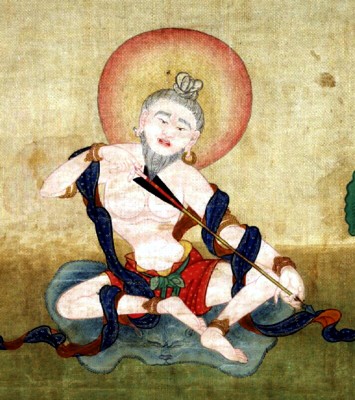Saraha
Jump to navigation
Jump to search

Saraha (Skt.; Tib. མདའ་བསྣུན་, danün, Wyl. mda' bsnun) was one of the greatest Indian mahasiddhas and is known for his celebrated songs of realization (Skt. dohā). He was also one of Nagarjuna's teachers. In iconography he is depicted holding an arrow.
Writings
- Treasury of Songs (Skt. Dohākoṣa)
- English translation: Klaus-Dieter Mathes and Péter-Dániel Szántó, Saraha’s Spontaneous Songs, With the Commentaries by Advayavajra and Mokṣākaragupta (Wisdom Publications 2024)
According to the Tibetan tradition, Saraha's dohas can be divided into three cycles:
- the King Dohas,
- Queen Dohas and
- People Dohas.
The Dohākoṣa corresponds to the 'People Dohas'.
Further Reading
- Abhayadatta, Buddha's Lions: Lives of the Eighty-four Siddhas, Emeryville, Dharma Publishing, 1979
- Herbert V. Guenther, Ecstatic Spontaneity: Saraha's Three Cycles of Doha, Asian Humanities Press, 1993 (includes translations of the King, Queen and People Dohas)
- Herbert V. Guenther, The Royal Song of Saraha, Berkeley: Shambhala, 1973
- Kurtis R. Schaeffer, Dreaming the Great Brahmin: Tibetan Traditions of the Buddhist Poet-Saint Saraha, Oxford University Press, 2005
- Khenchen Thrangu Rinpoche, A Song for the King: Saraha on Mahamudra Meditation, ed. by Michele Martin, tr. by Michele Martin & Peter O'Hearn, Boston: Wisdom, 2006
- Roger R. Jackson, Tantric Treasures: Three Collections of Mystical Verse from Buddhist India, Oxford University Press, 2004